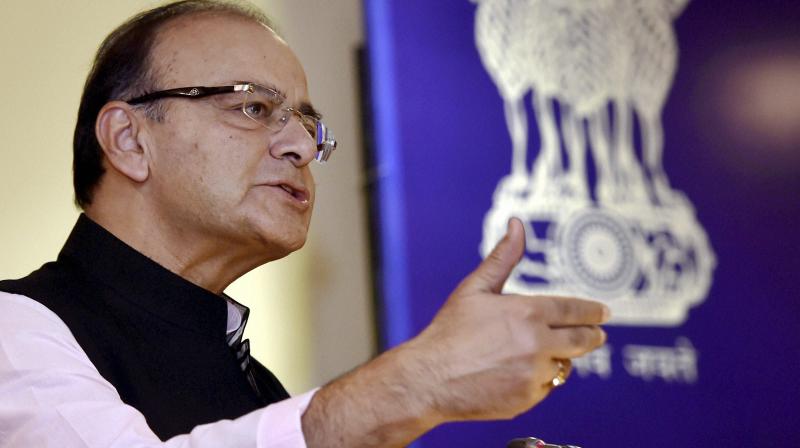India readies budget to soothe voters after PM Modi's shock cash crunch
Private economists expect Jaitley to plan a union fiscal deficit of 3.3-3.4 pc of gross domestic GDP for 2017/18.

New Delhi: Finance Minister Arun Jaitley will present the most challenging budget of his tenure on Wednesday, as he seeks to appease voters still hurting from the radical monetary shock therapy that his government has administered.
The 2017/18 budget comes less than three months after Prime Minister Narendra Modi's bold and risky gamble to outlaw high-value old currency bills, which has slammed the brakes on Asia's third-largest economy and hit the poor particularly hard.
According to one survey, a third of people say their incomes have fallen, with nearly a tenth saying they are much worse off.
Judging how quickly the economy will recover is a tough call, making Jaitley's revenue projections a shot in the dark.
A delay in the launch of a new national sales tax has added to the uncertainty. The Goods and Services tax (GST) is expected to improve tax compliance and check evasion, but the union and state governments have yet to work out its details.
Officials say his fourth budget will likely offer modest tax concessions and ramp up spending to ease the pain caused by Modi's decision in November to scrap 86 percent of the currency in circulation in a bid to purge the cash-reliant economy of illicit "black money" and expose untaxed wealth.
Paying for those giveaways may require Jaitley to slow the pace of fiscal tightening, officials told Reuters.
As well as buoying consumer spending, which contributes nearly 60 per cent to gross domestic product, sops to voters could also shore up the fortunes of Modi's nationalist party in five regional elections for which voting begins on Saturday.
The electoral outcome, particularly in the battleground state of Uttar Pradesh that is home to one in every six Indians, is being viewed by analysts as a mid-term "referendum" on Modi.
If voters deliver a negative verdict on his cash clampdown, his chances of winning a second term in 2019 as prime minister would suffer.
Yet even though the cash crunch has inflicted the most pain on the poor, Modi has said in his campaign speeches it would punish the venal rich. Bad economics may be good politics, say some analysts.
"Indian politics is determined by intangible factors of voter perception and not necessarily just the tangible economic numbers," said Shailesh Kumar, a senior analyst with Eurasia Group.
"For the Indian voter, demonetisation signals that Modi is trying, and is perhaps the only one doing something to address corruption."
Debt-fuelled spending
Private economists expect Jaitley to plan a union fiscal deficit of 3.3-3.4 per cent of gross domestic product (GDP) for 2017/18.
That is higher than the 3 percent pledged earlier but lower than 3.5 per cent that the government has budgeted for the current year to the end of March.
That would create space to invest an extra $6 billion, but would be anathema to ratings agencies concerned that India's high national debt exposes it to shocks, such as a possible spike in oil prices.
Federal revenues are expected to increase as a share of GDP by 0.5 percent in the current fiscal year, thanks to incremental hikes in fuel duties.
Ahead of the GST's expected launch from July 1, Jaitley may increase the service tax rate to bring it into line with the proposed standard rate under the new tax regime.
An income tax amnesty scheme launched after Modi's banknote ban is also likely to lift receipts, but officials are reluctant to say by how much. Similarly, expansion in the formal economy following demonetisation should widen the tax base.
"The new (financial) year is likely to be a year of direct tax buoyancy," said Pranjul Bhandari, chief India economist at HSBC.
India, meanwhile, risks losing its status as the world's fastest-growing big economy to China. The International Monetary Fund this month cut its 2016/17 forecast by one percentage point to 6.6 percent.
India's automobile sales saw their biggest monthly fall in 16 years in December, the first full calendar month after the note ban. Sales took the biggest hit in rural areas where cash transactions predominate.
CMIE, an economic think tank, fears a failure to revive consumer demand will leave growth languishing at about 6 percent over the next five years, a marked slowdown from an average rate of 7.1 percent in the past three years.
"Government (spending) has a smaller role and can contain the damage only partially," said Mahesh Vyas, chief executive officer at CMIE.

